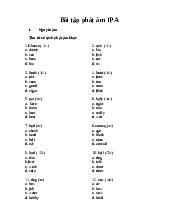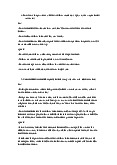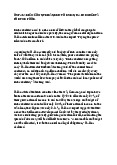





Preview text:
1. What is interpreting?
- Interpreting is rendering information and ideas from one language into another language by means of speaking.
2. What core competencies are required for an interpreter to fulfil the mediating task?
( Những năng lực cốt lõi nào được yêu cầu đối với một thông dịch viên để hoàn thành nhiệm vụ trung gian?)
- Language proficiency, knowledge, skills, professionalism
3. Where can intepreting be performed? ( domain and setting)
- Hospitals, law courts, television shows, the Oval Office, university lectures, business
negotiations, church services, guided tours of scenic spots, prisoner interrogations, meetings
of NGOs, corporate boards and the UN Security Council
. 4. How is Translation different from Interpreting?
- Translators work with the written words, while interpreters work with the spoken or signed .
5. What is the difference between the role of a translator and that of an interpreter?
- A translator plays the role as a writer and an interpreter plays the role as an actor.
6. What are the skills needed to be a translator?
- good writing and editing skills. For comprehension, they need to have good reading skills.
7. What are the skills needed to be an interpreter?
- good memory and speaking skills. For comprehension, they need to have good listening skills as well.
8. In terms of expression, grammar and structure, whose products (translators' or
interpreters') are more accurate? Why?
- Translators’s because they having longer time for checking and assessing.
9. What are the differences between the setting of a translator and that of an interpreter?
- translators can work at home or any place
- interpreters have to change of their working at the requests of their clients
10. What are the modes of interpreting?
- Bilateral or Liaison interpreting, -Consecutive interpreting, -Simultaneous interpreting, - Whispered Interpreting -Sight Translation;
11. What is consecutive interpreting?
- The interpreter listens to a speech while taking notes. When the speaker has finished,the
interpreter stands up and delivers the speech in his or her native language.
12. What is simultaneous interpreting?
-The listener hears the interpretation at the same time as the speech is made.The interpreter
sits in a booth wearing headphones with a microphone.
- 13. What is the most demanding mode of interpreting?
(Chế độ phiên dịch đòi hỏi khắt khe nhất là gì?) - Simultaneous Interpreting.
14. What are some barriers to communication?
(Một số rào cản đối với giao tiếp là gì?) - different languages
- different bodies of knowledge - different educations - different cultures.
15. What does a good consecutive interpreter need?
- Knowledge of the language,memory,concentration and understanding.
16. What are the three basic stages in the consecutive interpreting process?
(Ba giai đoạn cơ bản trong quá trình phiên dịch liên tiếp là gì?)
- understanding, analysing and re-expressing.
17. Is the notion of "understanding" in interpreting is of ideas or words?
- The understanding in interpreting is not of words but ideas.
18. What should interpreters do when they do not know a word or an expression, can
neither avoid it nor deduce its meaning from context, and are consequently stuck?
(Phiên dịch viên nên làm gì khi họ không biết một từ hoặc một cách diễn đạt, không thể tránh
nó cũng như không thể suy ra nghĩa của nó từ ngữ cảnh và do đó bị mắc kẹt?)
- In those circumstances, the interpreter, particularly in consecutive where there is a
straightforward human contact with the delegates, must admit their ignorance, and, if
necessary, clarify the question with the delegates.
19. May it well be perfectly possible to interpret a speaker's meaning without actually
understanding every single word and expression they use? Why?
(Có thể hoàn toàn có thể diễn giải ý nghĩa của người nói mà không cần thực sự hiểu từng từ
và cách diễn đạt mà họ sử dụng không? Tại sao?)
- Yes, because it is the ideas that have to be interpreted not words.
20. Why is it necessary for the interpreter to make an analysis of the speech type?
(Tại sao phiên dịch viên cần phân tích loại bài phát biểu?)
- It is necessary for the interpreter to make an analysis of the speech type as this will
influence both the fine-tuning of their listening and most certainly the style and content of their interpretation.
21. What should the interpreter pay attention to when interpreting a narrative, chronological speech?
(Phiên dịch viên cần chú ý điều gì khi phiên dịch một bài phát biểu tường thuật, theo trình tự thời gian?)
- the interpreter must pay due attention: time phrases, dates and verb tenses.
22. What should the interpreter pay attention to when interpreting a descriptive speech?
(Phiên dịch viên cần chú ý điều gì khi phiên dịch một bài diễn văn miêu tả?)
-The only thing an interpreter can do with descriptions is concentrate as hard as possible,
decide what the most important information is, and remember and note down as much as possible of that.
23. What must the interpreter know in order to be able to interpret a speaker's ideas?
(Thông dịch viên phải biết gì để có thể diễn giải ý tưởng của người nói?)
- In order to be able to interpret a speaker's ideas you must know first of all what is important
in their comments and what is secondary, what is essential and what accessory. The
interpreter, in analyzing a speech, must therefore identify the main ideas, and know they are the main ideas.
24. Why is it important for the interpreter to identify the main ideas of the speaker?
(Tại sao điều quan trọng là phiên dịch viên phải xác định ý chính của người nói?)
- If everything is given the same weight and no particular elements or threads are highlighted,
making it difficult for the listener of the interpretation to know what the speaker is really trying to say.
-Second reason for systematically identifying the main ideas
- Third,the recall of the speech necessary in consecutive will be easier
- It is useful for all interpreters to be capable of providing a summary of a speech.
25. What are the three basic questions that the interpreter is expected to answer in
order to locate the main ideas?
The three basic questions: who? what? when? Or more specifically: who does what, and
when, and who says or thinks what.
26. What are the four basic types of links? Give examples for each type
. -The four basic types of links
- logical consequence, logical cause, sequential ideas, opposition.
27. What are the two crucial moments in any speech during which the interpreter must
particularly concentrate hard on?
(Hai thời điểm quan trọng trong bất kỳ bài phát biểu nào mà phiên dịch viên phải đặc biệt tập trung vào là gì?)
- The beginning and the end of the speech.
28. What should the interpreter do to establish contact with the audience and deliver the
speech efficiently when re- expressing the speaker's ideas?
(Phiên dịch viên nên làm gì để thiết lập mối liên hệ với khán giả và truyền tải bài phát biểu
một cách hiệu quả khi diễn đạt lại ý tưởng của người nói?)
- First you must ask yourself whether the advantage of putting a question outweights the disadvantage.
-Second ,you must ask yourself in all honesty whether the question is really necessary to
improve the interpretation,or whether it is just for your personal edification.
-Third,the interpreter should put their question,poliety,to the speaker in the speaker’s own
language ,and not forget to thank the speaker when the information is given
-A fourth, the question,to be useful,must be clear and precise,and elicit an equally clear and
precise answer from the speaker.
29. What is professional ethics?
- The principles that govern the behaviour of person or group in a business environment.
30. What is the role of a code of ethics for a profession?
(Vai trò của quy tắc đạo đức nghề nghiệp là gì?)
- to safeguard the welfare of its clients
- to ensure that the professional activities of its members are of a high standard
- to ensure that the profession has a high status in the eyes of society
- to have standards to base on in cases of professional negligence or malpractice.
31. What are general principles of common ethics for interpreters?
(Các nguyên tắc chung về đạo đức chung cho phiên dịch viên là gì?) - Ensure accuracy - Ensure impartiality - Ensure competence -Ensure confidentiality
32. What do interpreters need to do before interpreting assignment?
(Phiên dịch viên cần làm gì trước khi phân công phiên dịch?)
- Briefing on the subject (a meeting for getting information or instructions)
-Preparation: prepare appropriately for assignments (e.g. terminology)
- Punctual at all times (and if lateness is unavoidable, advise clients immediately)
- Ready (pen, paper for notes...)
33. What do interpreters need to do during interpreting assignment?
- Always be polite and courteous, unobtrusive, firm and dignified - Ensure accuracy - Ensure impartiality - Ensure competence
34. What do interpreters need to do after interpreting assignment?
- No acceptance of gifts: decline gifts and tips (except token gifts customary in some cultures)
- Confidentiality review and re-evaluate their work - Self-evaluation: performance
35. Why is it important to take notes?
- to relieve strain on the interpreter's memory. - to jog memory
36. What should we bring with us when taking notes?
- A5 sized notepad, pens, pencils
37. Can note-taking replace memory?
-No, NT is to help not to replace.
38. Is it good to write down everything one hears when interpreting? - No
39. Why should we use one side of the page when taking notes?
- Because we can turn the pages easily when interpreting.
40. Is it a good idea to note immediately?
- No, only when you understand/ or after analysing what you hear.
41. Do we have to take note every single word? - No, just ideas, not words.
42. Present the correct way of taking notes.
Trình bày đúng cách ghi chép.
- write on one side of the page
- must be eligible and decipherable - write vertically
- use symbols and abbreviations
- separate ideas by drawing a line
- leave a margin to highlight links or certain things
- emphasize by underlining and negation by a line running through a word or symbol.
43. In what language should we note in interpreting?
Phiên dịch cần lưu ý ngôn ngữ nào
- Any language you can write faster.
44. Do we stop taking notes when we don't understand the speaker?
45. What do we ask the speaker when we don't understand, specific points or the whole speech?
Chúng ta hỏi người nói điều gì khi chúng ta không hiểu, những điểm cụ thể hoặc toàn bộ bài phát biểu? - No, keep taking notes. - specific points.
46. Should the interpreters read from notes when interpreting?
- No, glance at notes from time to time.
47. If the speaker makes mistakes, can the interpreter comment or add things or criticize? - No, never.
48. How many types of memory are there in the memory system? What are they? -Two.
Short-term short-term memory and long-term memory.
49. What are the different of short-term memory and long- term memory?
- The idea of short-term memory simply means that you are retaining information for a short
period of time without creating the neural mechanisms for later recall.
- Long-Term Memory occurs when you have created neural - pathways for storing ideas and
information which can then be recalled weeks, months, or even years later.
50. Why do we forget from our short-term memory?
- There are three main theories as to why we forget from our STM:
(1) Displacement existing information is replaced by newly received information when the storage capacity is full
(2) Decay-information decays over time.
(3) Interference- other information present in the storage at the same time distorts the original information.




